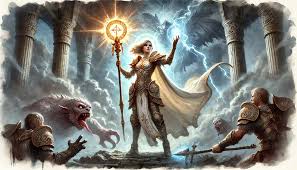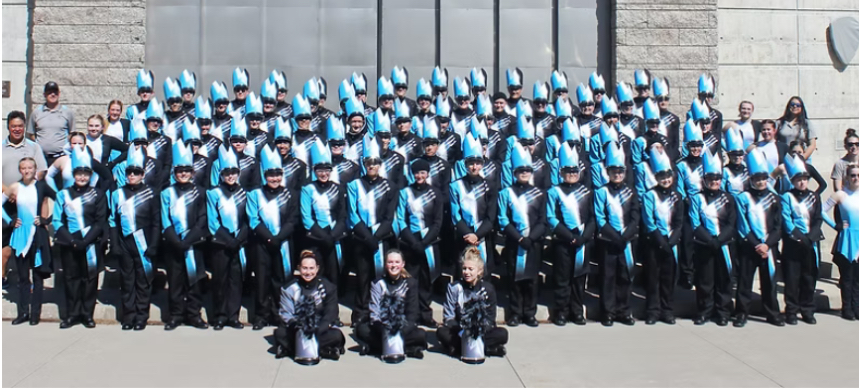Clerics in Dungeons & Dragons 5th Edition (D&D 5E) are often seen as healers, but they’re far more than just the party’s medic. Clerics channel divine power granted by their gods, giving them unique access to spells and abilities that can heal, defend, and deal damage. In D&D 5E, they are one of the most versatile classes, with different divine domains offering distinct flavors, playstyles, and roles within a party.
This guide will introduce new players to the ins and outs of creating and playing a Cleric.
What is a Cleric in D&D 5E?
Clerics are devout followers of gods or powerful entities, drawing magic from their divine patrons. As a full caster, they have access to a large spell list, making them one of the most powerful spellcasting classes in the game. Their spells and abilities vary based on their chosen Divine Domain and the relationship they have with their deity.
A Cleric’s deity shapes their values, goals, and personality. As such, playing a Cleric often involves role-playing aspects centered around faith and purpose, in addition to their impressive magical capabilities.
Step-by-Step Guide to Creating a Cleric
1. Choose Your Divine Domain
The Divine Domain you choose at 1st level defines your cleric’s abilities, spells, and role within the party. Here’s an overview of popular domains:
- Life Domain: The quintessential healer, with powerful healing spells and bonuses to healing spells. Great for players focused on support.
- Light Domain: Radiant damage and control spells make this a great offensive choice. It’s perfect for players who want to wield the power of light to blast foes.
- Tempest Domain: Combines thunder and lightning spells with the ability to wear heavy armor and smite enemies in melee. Ideal for players who want to mix offense and defense.
- War Domain: Grants martial abilities, weapon proficiency, and extra attacks, making it a solid choice for Clerics who want to fight on the front lines.
- Knowledge Domain: Provides utility spells and the ability to gain skills and knowledge. Perfect for Clerics who want to be scholars or explorers.
- Trickery Domain: Focuses on deception, illusion, and stealth. If you want to be a sneaky, unpredictable cleric, this is the way to go.
Each domain not only gives unique abilities but also adds flavor to your character’s relationship with their deity and the values they uphold. For example, a Life Domain cleric might see healing as a sacred duty, while a War Domain cleric might view battle as a divine calling.
2. Choose Your Race
Some races are better suited to Cleric abilities due to bonuses to Wisdom (the Cleric’s primary spellcasting ability) or Constitution (for durability).
- Hill Dwarf: Offers a bonus to Wisdom and extra hit points, making them hardy healers.
- Aasimar: Especially good for Life Clerics due to their radiant damage and healing abilities, as well as their Charisma boost, which complements a role-play-heavy approach.
- Wood Elf: A good choice for Wisdom and Dexterity, helpful for Light Domain clerics who may want to keep their distance.
- Human (Variant): With a feat at 1st level, the Variant Human is flexible for any build, allowing you to focus on specific abilities or skills.
Choose a race that not only complements your Cleric’s stats but also fits well with their background and connection to their deity.
3. Ability Scores and Skills
For a Cleric, Wisdom is the most important ability score because it powers your spellcasting and healing abilities. Constitution should be the second priority to increase your hit points and concentration saves. Strength is important for melee-focused Clerics, while Dexterity is useful for more agile builds, like Light Domain Clerics.
A suggested ability score priority for Clerics is:
- Wisdom (for spellcasting, healing, and domain abilities)
- Constitution (for more hit points and concentration checks)
- Strength or Dexterity (depending on melee or ranged focus)
For skills, consider the following:
- Religion: Understanding divine lore is a natural fit for any Cleric.
- Medicine: This complements a healer role, especially for Life Domain Clerics.
- Insight: Great for understanding people, which fits well with a wise, perceptive character.
- Persuasion or History: Useful if your character is a speaker for their god or a scholar.
4. Cleric Class Features
The Cleric class has several powerful abilities that make them essential to any party:
- Divine Domain: Your choice of domain defines much of your character’s role and spell options, offering unique abilities at 1st level and as you level up.
- Channel Divinity: A powerful ability that lets you call upon your deity for a unique effect, usually once per short rest. Each domain has its own unique Channel Divinity options, such as turning undead, charming enemies, or boosting damage.
- Divine Intervention (10th Level): A once-per-week ability that allows you to call directly on your deity for assistance. If successful, the results can be game-changing, as the DM interprets your god’s intervention.
5. Spellcasting
Clerics have a vast spell list and can prepare spells after each long rest. This flexibility lets you adapt to the needs of each day’s challenges. Key spells to consider include:
- Cantrips: Sacred Flame (damage), Guidance (ability check boost), Spare the Dying (stabilizing fallen allies).
- 1st-level Spells: Healing Word (ranged healing), Bless (boosts allies’ rolls), Shield of Faith (adds to an ally’s Armor Class).
- 2nd-level Spells: Spiritual Weapon (damage without concentration), Hold Person (crowd control), Lesser Restoration (cure conditions).
- 3rd-level Spells: Revivify (revives the recently deceased), Dispel Magic (removes magical effects), Spirit Guardians (strong defensive spell).
As you level up, you’ll gain access to higher-level spells, allowing you to cast spells like Heal, Mass Cure Wounds, and Holy Aura, which are essential for high-stakes battles.
Playing a Cleric: Role-Playing and Combat
1. Role-Playing Your Cleric
When you play a Cleric, your character’s faith is a central part of their identity. Here are some ways to role-play this:
- Devotion to a Deity: A Cleric’s bond with their deity is at the core of their character. Think about how this faith influences your character’s actions and how they view the world. Do they follow their god’s will strictly, or do they interpret it in their own way?
- Interaction with Others: Clerics are often seen as moral compasses or wise counselors. This can make them natural leaders or support characters within the party, depending on your playstyle and personality.
- Conflict of Faith: Situations may arise that test your character’s beliefs. This can be a chance for role-play and character development, as your Cleric navigates the challenges of faith and duty.
2. Combat Strategy
Clerics can be powerful in combat, whether by casting offensive spells, supporting allies, or joining the fight directly. Here are some tips based on your domain and playstyle:
- Healing and Buffing: Keep an eye on the battlefield and decide when to use spells like Healing Word, Cure Wounds, or Bless. Boosting your allies can turn the tide of battle, especially if you have limited resources.
- Crowd Control: Cleric spells like Hold Person, Banishment, and Spirit Guardians are excellent for controlling enemies. These spells allow you to restrict enemy movement or incapacitate threats while your allies focus on dealing damage.
- Damage Dealer: With spells like Guiding Bolt, Inflict Wounds, and Spiritual Weapon, Clerics have plenty of offensive options. Life Domain Clerics can heal, while Tempest or Light Domain Clerics have access to damage-focused spells.
- Use Channel Divinity: Each domain’s Channel Divinity is unique. Light Domain Clerics can blind foes with Radiance of the Dawn, while Tempest Clerics can push enemies with thunderous force. Use Channel Divinity strategically based on the situation and your domain’s abilities.
3. Adapt Your Spells
Clerics have the advantage of preparing their spells daily, allowing you to adjust based on the challenges you’re facing. If your party is venturing into dangerous territory, consider preparing more healing and defensive spells. If you’re planning to face undead, make use of Turn Undead and radiant spells.
Conclusion
The Cleric in D&D 5E offers depth, power, and versatility, making them one of the most impactful classes to play. With the ability to adapt to any situation, Clerics excel at keeping their allies alive, providing essential support, and dealing damage when needed. Whether you’re a healer, warrior, or spiritual guide, playing a Cleric lets you bring divine power to your party.
Prepare your holy symbol, recite your prayers, and embrace the power of the divine as you take on the role of a Cleric!












